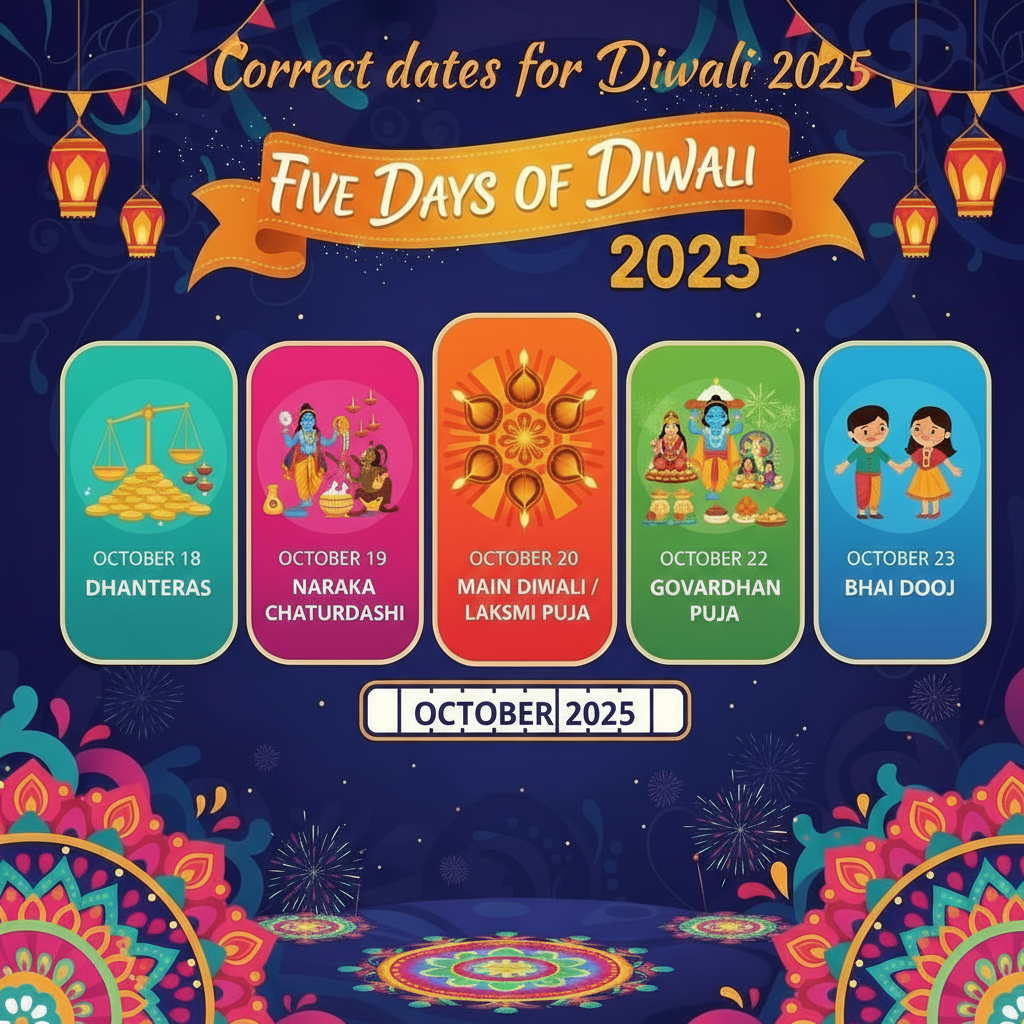Diwali 2025 Calendar: When Are Dhanteras, Choti Diwali, Diwali, Govardhan Puja & Bhai Dooj? Dates and Shubh Muhurat for All 5 Days
Celebrate Diwali 2025 in India with Lights, Learning and Laughter
Diwali, the festival of lights, is one of the most joyful and awaited festivals in India. Families decorate their homes with diyas, lights, and rangoli to welcome positivity and happiness.

If you are wondering “When is Diwali in 2025?” or “What are the five special days of Deepavali?”, here’s everything you need to know explained in a simple, student-friendly way.
Know About it: Rangoli Designs for Diwali 2025
When is Diwali in 2025?
According to the Hindu calendar, Diwali is celebrated on the Amavasya Tithi of the Kartik month. In 2025, this Amavasya Tithi starts at 3:44 PM on October 20 and ends at 5:54 PM on October 21.
Since the Amavasya begins before sunset on October 20, most Panchang calculations mark Monday, October 20, 2025, as the day for Diwali and Lakshmi Puja.
Here are the Key Timings for the Day:
Lakshmi Puja Muhurat: 7:08 PM – 8:18 PM
Pradosh Kaal: 5:46 PM – 8:18 PM
Vrishabha Kaal: 7:08 PM – 9:03 PM
These times are considered most auspicious for performing the Lakshmi Puja, which is the central ritual of Diwali celebrations.
Also Read: Pollution Free Paper Crafts for Diwali
Diwali 2025 Calendar: The Five Joyful Days
The festival of Diwali is not just a one-day celebration. It is a five-day festival, each day having its own meaning, rituals, and stories.
Here’s a look at the Diwali 2025 calendar with all the important dates, puja timings, and what each day represents.
Diwali Puja 2025: Timings and Muhurat
Amavasya Tithi Begins: October 20, 2025 – 03:44 PM
Amavasya Tithi Ends: October 21, 2025 – 05:54 PM
Lakshmi Puja Muhurat: October 20, 2025 – 07:08 PM to 08:18 PM
Pradosh Kaal: 05:46 PM to 08:18 PM
Vrishabha Kaal: 07:08 PM to 09:03 PM
These timings are based on the Panchang and are considered ideal for performing Diwali Puja 2025 rituals.
Significance of Diwali 2025
Diwali, or Deepavali, celebrates the victory of light over darkness and good over evil.
According to the Ramayana, it marks Lord Rama’s return to Ayodhya after defeating the demon king Ravana. People lit diyas to guide his way home, a tradition that continues to this day.
Each day of Diwali holds a special spiritual meaning:
Dhanteras Puja – welcomes wealth and prosperity.
Choti Diwali – clears away negativity and invites light.
Main Diwali – honors Goddess Lakshmi and celebrates inner peace.
Govardhan Puja – reminds us of the value of gratitude and protection.
Bhai Dooj – strengthens the love between siblings.
Across India, Diwali unites people in joy, giving, and gratitude. It’s not only about lights and sweets but also about renewal, positivity, and hope.
Quick Summary: Diwali 2025 at a Glance
As you light diyas and celebrate Diwali 2025 in India, remember what the festival truly means spreading happiness, gratitude, and love.
Share sweets, smiles, and positive energy with everyone around you. After all, every diya you light brings a little more brightness to the world.
Happy Diwali 2025 from Vedantu!
FAQs on Diwali 2025 Calendar: When Are Dhanteras, Choti Diwali, Diwali, Govardhan Puja & Bhai Dooj? Dates and Shubh Muhurat for All 5 Days
1. What are the 5 days of Diwali?
Dhanteras, Choti Diwali or Naraka Chaturdashi, Lakshmi Puja on the main Diwali night, Govardhan Puja, and Bhai Dooj. That is the standard Diwali 5 days name list most families follow.
2. Which date is the main Diwali in 2025?
The main Diwali with Lakshmi Puja is on Monday, October 20, 2025 in India, with evening muhurat around Pradosh Kaal.
3. When is Naraka Chaturdashi in 2025?
Monday, October 20, 2025 is widely listed for Naraka Chaturdashi, though many regions observe Choti Diwali rituals on the evening of October 19 as the tithi overlaps. Follow your local panchang.
4. Why do some pages show small differences in dates?
Diwali follows the lunar tithi and local sunset timings. Trusted panchang sites list city-wise muhurats which can shift by location.
5. What is the Correct date of Diwali 2025?
Diwali 2025 will be celebrated on Monday, October 20, as per the Hindu lunar calendar. The festival falls on the Amavasya Tithi of the Kartik month and symbolizes the triumph of light over darkness and good over evil, bringing joy, peace, and prosperity to homes across India.







